Fuzzing Android Native libraries with libFuzzer + QEMU 🦥

TL;DR In this blog post, I will go through the process of why and how I built a new framework called Sloth 🦥, using which, I was able to fuzz Android Native libraries with libFuzzer and QEMU. You will see me talking about QEMU internals, and showcasing my patches. Finally you will see the running demo of my Sloth framework to perform the fuzzing for Skia library.
Introduction aka how it all started...
Initially, my goal was to build a tool to fuzz Android native libraries with libfuzzer and QEMU to perform binary-only code-coverage fuzzing. I checked if someone has already worked on this, but I couldn't find any such public implementations. So, to achieve this, I decided to patch QEMU and libFuzzer and dug deep into some internals of QEMU, QEMU TCG, ELF loaders, libFuzzer's custom coverage. In doing so, I built Sloth🦥 framework which I can use to fuzz Android Native libraries.
I want to make use of QEMU’s user-mode emulation (
qemu-linux-user. let's call this QUME 🤔) onx86_64host to emulate aarch64 Android libraries and I want my final harness to be look like this
import <the target library here>
extern "C" int libQEMUFuzzerTestOneInput(const uint8_t *Data, size_t Size) {
{
targetFunction(Data, Size);
}QEMU Internals
I'm just gonna give a really basic introduction to QEMU internals and it's source code (PS: I'm no expert in QEMU 🧐). I'm sure there are other awesome resources related to QEMU internals (eg: QEMU internals by airbus-seclab).
- Let's clone the source of latest QEMU (QEMU 5.1.0) from github using the following commands
➜ git clone --depth 1 --branch v5.1.0 https://github.com/qemu/qemu
➜ cd qemu/
➜ qemu > git submodule init
➜ qemu > git submodule updateWhen we compile, QUME, the main folder that's resposible for loading ELF into memory, cpu execution loop and syscall handlers is
linux-user. Folder looks something like this (stripped irrelevant directories from the output):
➜ > cd qemu/linux-user/
➜ linux-user > tree .
.
|____linuxload.c
|____uname.h
|____mmap.c
|____exit.c
|____fd-trans.h
|____elfload.c
|____syscall.c
|____trace.h
|____main.c
|____syscall_types.h
|____cpu_loop-common.h
|____syscall_defs.h
|____arm
| |____cpu_loop.c
| |____target_structs.h
| |____termbits.h
| |____target_elf.h
| |____syscallhdr.sh
| |____nwfpe
| | |____fpa11_cpdo.c
| | |____fpopcode.h
| | |____fpa11_cprt.c
| | |____double_cpdo.c
...
| |____target_syscall.h
| |____target_fcntl.h
| |____meson.build
| |____target_signal.h
| |____syscall.tbl
| |____sockbits.h
| |____signal.c
| |____target_cpu.h
|____aarch64
| |____cpu_loop.c
| |____target_structs.h
| |____termbits.h
| |____target_elf.h
| |____target_syscall.h
| |____target_fcntl.h
| |____target_signal.h
| |____sockbits.h
| |____signal.c
| |____syscall_nr.h
| |____target_cpu.h
|____socket.h
|____uaccess.c
|____ioctls.h
|____semihost.c
|____qemu.h
|____fd-trans.c
...Here, main.c has the main function implementation for linux-user, syscall.c is responsible for syscall implementation, elfload.c is responsible for parsing and loading ELF into memory and cpu_loop.c inside aarch64 folder is responsible for cpu_exec of aarch64 architecture.
QEMU Internals - The Tiny Code Generator (TCG)
The Tiny Code Generator (TCG) is responsible to transform target instructions (the processor being emulated, in our case aarch64) into host instructions (the processor executing QEMU itself, in our case x86_64). A TCG frontend lifts native target instructions into an architecture-independent intermediate representation (IR). A TCG backend then lowers the IR into native host instructions. The translation is done on-the-fly during emulation at the basic block level.
- The code for the TCG resides in
qemu/tcg/
➜ cd qemu/tcg/
➜ tcg git:(609d759) ✗ tree .
.
|____tci
| |____tcg-target.c.inc
| |____tcg-target.h
| |____README
| |____tcg-target-con-set.h
| |____tcg-target-con-str.h
|____tcg-op-gvec.c
|____tcg-pool.c.inc
|____i386
| |____tcg-target.c.inc
| |____tcg-target.h
| |____tcg-target-con-set.h
| |____tcg-target-con-str.h
| |____tcg-target.opc.h
....
|____tcg.c
....
|____tci.c
|____README
....
|____tcg-op.c
|____optimize.c
|____tcg-common.c
|____tcg-op-vec.c
|____arm
| |____tcg-target.c.inc
| |____tcg-target.h
| |____tcg-target-con-set.h
| |____tcg-target-con-str.h
....
|____aarch64
| |____tcg-target.c.inc
| |____tcg-target.h
| |____tcg-target-con-set.h
| |____tcg-target-con-str.h
| |____tcg-target.opc.h
....
|____tcg-ldst.c.incThe code I patched in QEMU’s user-mode emulation recides inside
linux-userfolder. The execution of QUME starts frommain.c(int main(int argc, char **argv, char **envp)) insideqemu/linux-user/.
- High level execution flow of QUME:
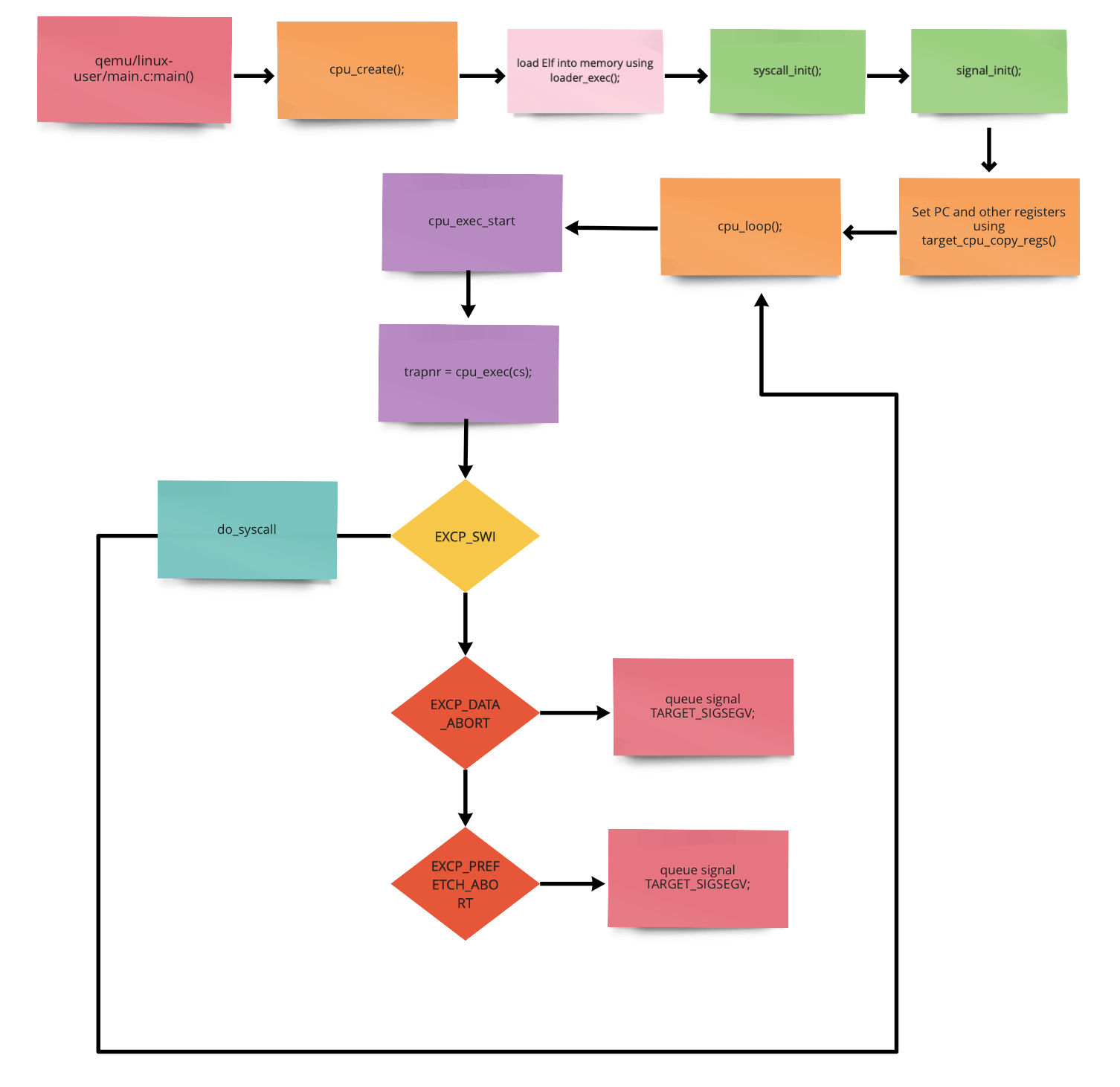
- The interesting function to start with from the above flow is
cpu_exec
int cpu_exec(CPUState *cpu)
{
CPUClass *cc = CPU_GET_CLASS(cpu);
int ret;
SyncClocks sc = { 0 };
/* replay_interrupt may need current_cpu */
current_cpu = cpu;
....
/* if an exception is pending, we execute it here */
while (!cpu_handle_exception(cpu, &ret)) {
TranslationBlock *last_tb = NULL;
int tb_exit = 0;
while (!cpu_handle_interrupt(cpu, &last_tb)) {
uint32_t cflags = cpu->cflags_next_tb;
TranslationBlock *tb;
....
tb = tb_find(cpu, last_tb, tb_exit, cflags);
cpu_loop_exec_tb(cpu, tb, &last_tb, &tb_exit);
....
}
}
cpu_exec_exit(cpu);In
cpu_exec, QEMU first tries to look for existing TBs inside TB Cache, by callingtb_find. If there's no entry for the current location, it generates a new one withtb_gen_code. When a TB is found, QEMU runs it withcpu_loop_exec_tbwhich in short callscpu_tb_execand thentcg_QEMU_tb_exec. At this point our target code has been translated to host code, QEMU can run it directly on the host CPU.
QEMU Patches
Perfect!
With this basic understanding of QUME, we know that instrumentation for code-coverage fuzzing can be achived by making use of TBs inside tb_gen_code.
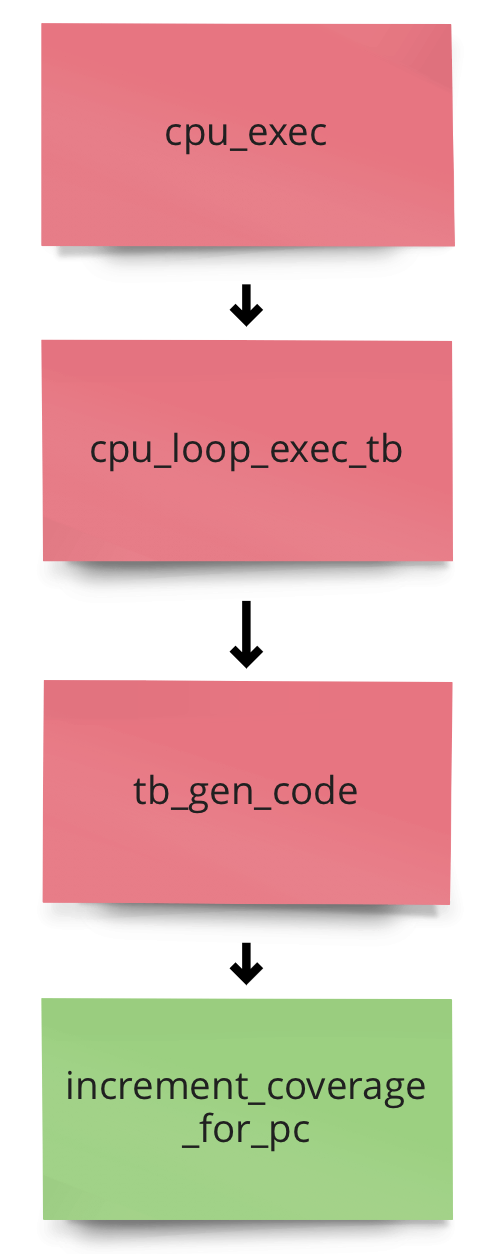
I made use of the afl_maybe_log and afl_gen_trace code from aflplusplus. I did not add probabilistic instrumentation implemendted in aflplusplus for now.
Added the following code to accel/tcg/translate-all.c file, and call afl_gen_trace function inside tb_gen_code before trace_translate_block function call. (PS: QEMU provides trace-events to trace all the TB executions using trace_translate_block)
#defined AFL_QEMU_NOT_ZERO
/* coverage bitmap */
extern unsigned char *afl_area_ptr;
/* NeverZero */
#if (defined(__x86_64__) || defined(__i386__)) && defined(AFL_QEMU_NOT_ZERO)
#define INC_AFL_AREA(loc) \
asm volatile( \
"addb $1, (%0, %1, 1)\n" \
"adcb $0, (%0, %1, 1)\n" \
: /* no out */ \
: "r"(afl_area_ptr), "r"(loc) \
: "memory", "eax")
#else
#define INC_AFL_AREA(loc) afl_area_ptr[loc]++
#endif
void HELPER(afl_maybe_log)(target_ulong cur_loc) {
register uintptr_t afl_idx = cur_loc ^ afl_prev_loc;
INC_AFL_AREA(afl_idx);
afl_prev_loc = cur_loc >> 1;
}
/* Generates TCG code for AFL's tracing instrumentation. */
static void afl_gen_trace(target_ulong cur_loc) {
/* Looks like QEMU always maps to fixed locations, so ASLR is not a
concern. Phew. But instruction addresses may be aligned. Let's mangle
the value to get something quasi-uniform. */
cur_loc = (cur_loc >> 4) ^ (cur_loc << 8);
cur_loc &= MAP_SIZE - 1;
TCGv cur_loc_v = tcg_const_tl(cur_loc);
gen_helper_afl_maybe_log(cur_loc_v);
tcg_temp_free(cur_loc_v);
}- Add the following line to
accel/tcg/tcg-runtime.h
DEF_HELPER_FLAGS_1(afl_maybe_log, TCG_CALL_NO_RWG, void, tl)Since libFuzzer is in-process, I would ideally want to launch QEMU only once per process and fuzz the target function from target library in-process. To make it work, I had to adjust the elf loader in QUME. In an ELF loader, when there's an interpreter, the Loader first jumps to the start of interp_entry. After loading all the dependent libraries, the execution is set to elf_entry. After finishing this execution, QUME exits.
To keep the fuzzing in-process, I patched few things:
- added a new variable
end_addrtostruct CPUARMState(envvariable) - patched
disas_a64_insnfunction insidetarget/arm/translate-a64.cto exit cpu_loop when thepc == end_addr. (this is the same way Unicornuc_emu_startuntilworks) - patch
loader_execand add a new functionrun_linker - in
run_linker, setregs->pctoinfop->interp_entry & ~0x3ULL; - set
env->end_addrtoinfop->entry. This'll make sure the execution will stop after executing only theinterpreter - execute
cpu_loop. - reset TB Cache
tb_flush(cpu);to get rid of the aboveenv->end_addr - set
env->addr_endto 0. - fetches pointer to
libQEMUFuzzerTestOneInputfrom loaded target library
By the time the execution reaches the last step in the above flow, all the dependent libraries of the ELF should be loaded in memory. Now I fetch the pointer to
libQEMUFuzzerTestOneInputfrom the harness library by calling thelibQEMUDlsymfunction and pass it tolibFuzzerStart.
- Changes to
main.ccode:
...
env->addr_end = info->entry; // we execute linker, i.e. till elf_entry
env->elf_entry = info->entry;
env->interp_entry = info->interp_entry;
cpu_loop(env);
//reset cache
cpu->halted = 0;
tb_flush(cpu);
env->addr_end = 0;
target_addr = libQEMUDlsym("libQEMUFuzzerTestOneInput");
// const uint8_t *h = NULL;
argc = argc-1;
argv[1] = argv[2];
libFuzzerStart(argc, argv, LLVMFuzzerTestOneInput);
...- And inside
LLVMFuzzerTestOneInput, I just assign the required registers to point to Data and Size and calllibQEMUFuzzerTestOneInput
int LLVMFuzzerTestOneInput(const uint8_t *Data, size_t Size)
{
previousLoc = 0;
thread_cpu->halted = 0;
regs->regs[0] = Data;
regs->regs[1] = Size;
regs->pc = target_addr & ~0x3ULL;
target_cpu_copy_regs(env, regs);
cpu_loop(env);
return 0;
}- Final folder structure of Sloth
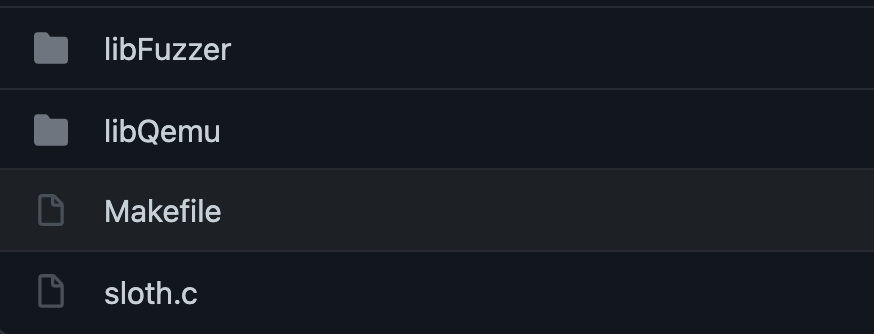
- In
sloth.c, i just calllibQEMUInitfrom QUME to start execution
int main(int argc, char* argv[], char* envp[])
{
DBGLOGN("==== SLOTH ====");
afl_area_ptr = (unsigned char *) malloc(sizeof(uint8_t)* MAP_SIZE);
memset(afl_area_ptr, 0, sizeof(uint8_t)* MAP_SIZE);
//start fuzzing
libQEMUInit(argc, argv, envp);
...
}Sloth Demo - 🦥
Slothis a fuzzing framework I made to fuzz Android Native libraries with libFuzzer and QEMU
- Build the Sloth docker image
export image="sloth:v1"
docker build -t $image .
docker run --rm -v `pwd`/:/home -v `pwd`/resources:/android -it $image bash- I made a simple library to fuzz.
root@4558d8a05c92:/android/examples/Sample# ls
jni seeds
root@4558d8a05c92:/android/examples/Sample# cd jni/
root@4558d8a05c92:/android/examples/Sample/jni# ls
Android.mk Application.mk Makefile boo.cpp lib
root@4558d8a05c92:/android/examples/Sample/jni# ls lib/
fuzz.cpp fuzz.h include- Target library
root@4558d8a05c92:/android/examples/Sample/jni# cat lib/fuzz.cpp
#define SK_BUILD_FOR_ANDROID
#include <stdio.h>
#include <stdint.h>
#include <stdio.h>
#include <stdlib.h>
#include <string.h>
#include <errno.h>
#include "fuzz.h"
extern "C" int libQEMUFuzzerTestOneInput(const uint8_t *Data, size_t Size) {
if (Size <5 && Size > 4096)
return 0;
if(Data[0] == 0x41)
{
if(Data[1] == 0x42)
{
if(Data[2] == 0x43)
{
if(Data[4] == 0x44)
{
if(Data[5] == 0x45)
{
//crash here
char * ptr = (char*) 0x61616161;
ptr[0]=0;
}
}
}
}
}
return 0;
}- Compile the target and copy libBooFuzz.so and boofuzz to
/android/rootfs/system/lib64/and/android/rootfs/respectively
root@4558d8a05c92:/android/examples/Sample/jni# make
ndk-build
make[1]: Entering directory '/android/examples/Sample/jni'
Android NDK: APP_PLATFORM not set. Defaulting to minimum supported version android-16.
Android NDK: WARNING:/android/examples/Sample/jni/Android.mk:BooFuzz: non-system libraries in linker flags: -lhwui
Android NDK: This is likely to result in incorrect builds. Try using LOCAL_STATIC_LIBRARIES
Android NDK: or LOCAL_SHARED_LIBRARIES instead to list the library dependencies of the
Android NDK: current module
Android NDK: WARNING:/android/examples/Sample/jni/Android.mk:boofuzz: non-system libraries in linker flags: -landroidicu -lGLESOverlay -lBooFuzz -landroidicu -lhwui
Android NDK: This is likely to result in incorrect builds. Try using LOCAL_STATIC_LIBRARIES
Android NDK: or LOCAL_SHARED_LIBRARIES instead to list the library dependencies of the
Android NDK: current module
make[1]: Leaving directory '/android/examples/Sample/jni'
make[1]: Entering directory '/android/examples/Sample/jni'
[arm64-v8a] Install : libBooFuzz.so => libs/arm64-v8a/libBooFuzz.so
[arm64-v8a] Install : boofuzz => libs/arm64-v8a/boofuzz
make[1]: Leaving directory '/android/examples/Sample/jni'
root@4558d8a05c92:/android/examples/Sample/jni# cp ../libs/arm64-v8a/boofuzz /android/rootfs/
root@4558d8a05c92:/android/examples/Sample/jni# cp ../libs/arm64-v8a/libBooFuzz.so /android/rootfs/system/lib64/- Finally, I can fuzz
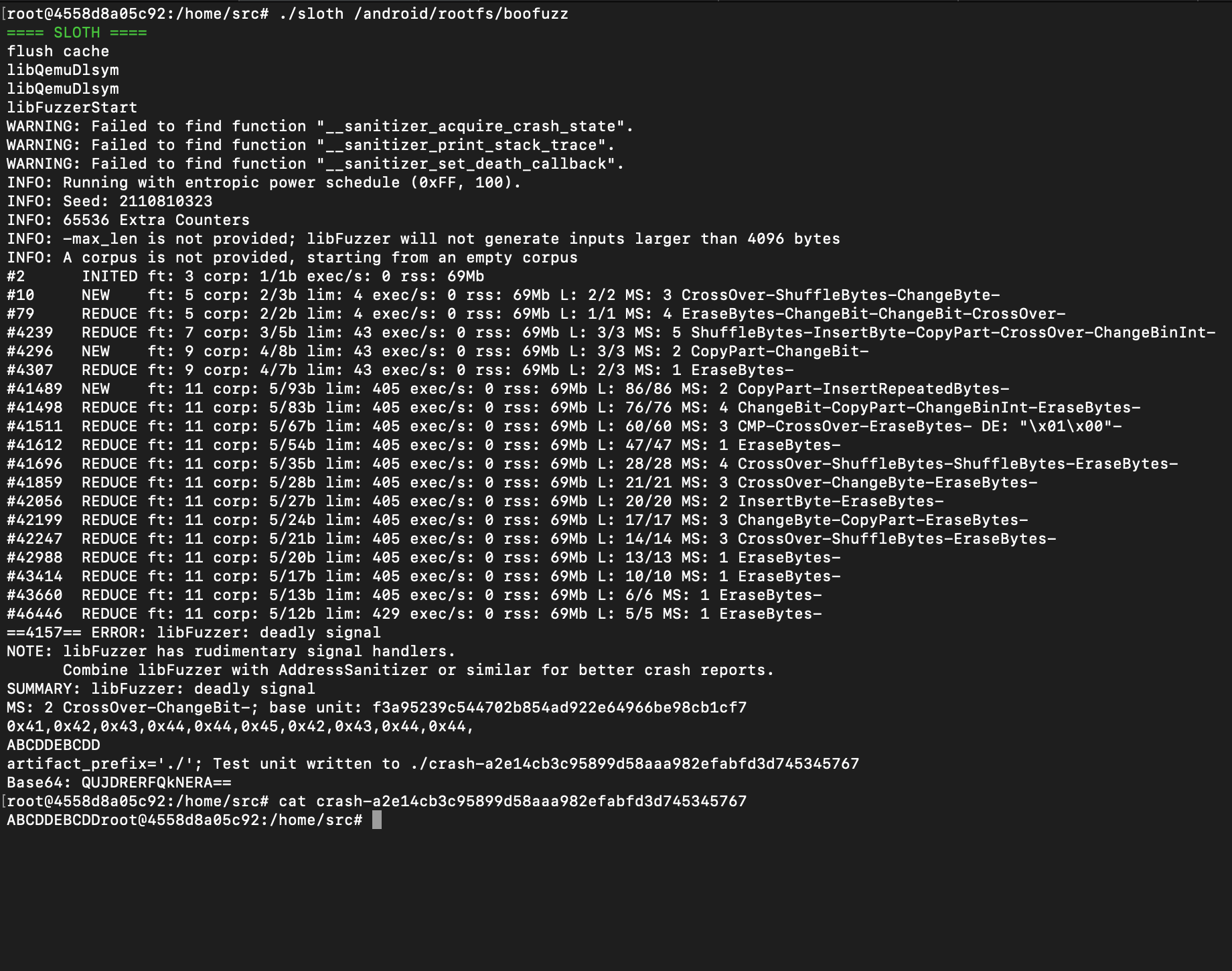
Yayyy, it works !!!! 🧐🧐🧐🧐🧐🕺🕺🕺🕺
Skia fuzzer - Sloth
Bonus, I also tried to fuzz Skia Image parsing by porting the harness made by j00ru, SKCodecFuzzer, to the new Sloth.
Final code for the port of SKCodecFuzzer to Sloth:
//just a quick port of the SKCodecFuzzer harness by j00ru
#define SK_BUILD_FOR_ANDROID
#include <stdio.h>
#include <stdint.h>
#include <stdio.h>
#include <stdlib.h>
#include <string.h>
#include <errno.h>
#include "fuzz.h"
#include "include/codec/SkAndroidCodec.h"
#include "include/core/SkBitmap.h"
#include "include/codec/SkCodec.h"
#include "include/core/SkString.h"
#include "include/core/SkPngChunkReader.h"
extern "C" int libQemuFuzzerTestOneInput(const uint8_t *Data, size_t Size) {
if (Size <1 && Size > 4096)
return 0;
void * DataMa = malloc(Size);
memcpy(DataMa, Data, Size);
sk_sp<SkData> data = SkData::MakeFromMalloc(DataMa, Size);
SkCodec::Result result;
std::unique_ptr<SkAndroidCodec> codec = SkAndroidCodec::MakeFromData(std::move(data), nullptr);
if (!codec) {
return 0;
}
SkImageInfo info = codec->getInfo();
const int width = info.width();
const int height = info.height();
SkColorType decodeColorType = kN32_SkColorType;
SkBitmap::HeapAllocator defaultAllocator;
SkBitmap::Allocator* decodeAllocator = &defaultAllocator;
SkAlphaType alphaType = codec->computeOutputAlphaType(/*requireUnpremultiplied=*/false);
const SkImageInfo decodeInfo =
SkImageInfo::Make(width, height, decodeColorType, alphaType);
SkImageInfo bitmapInfo = decodeInfo;
SkBitmap decodingBitmap;
if (!decodingBitmap.setInfo(bitmapInfo) ||
!decodingBitmap.tryAllocPixels(decodeAllocator)) {
return 1;
}
result = codec->getAndroidPixels(decodeInfo, decodingBitmap.getPixels(), decodingBitmap.rowBytes());
return 0;
}Coverage seems to be working fineeee 🕺🕺
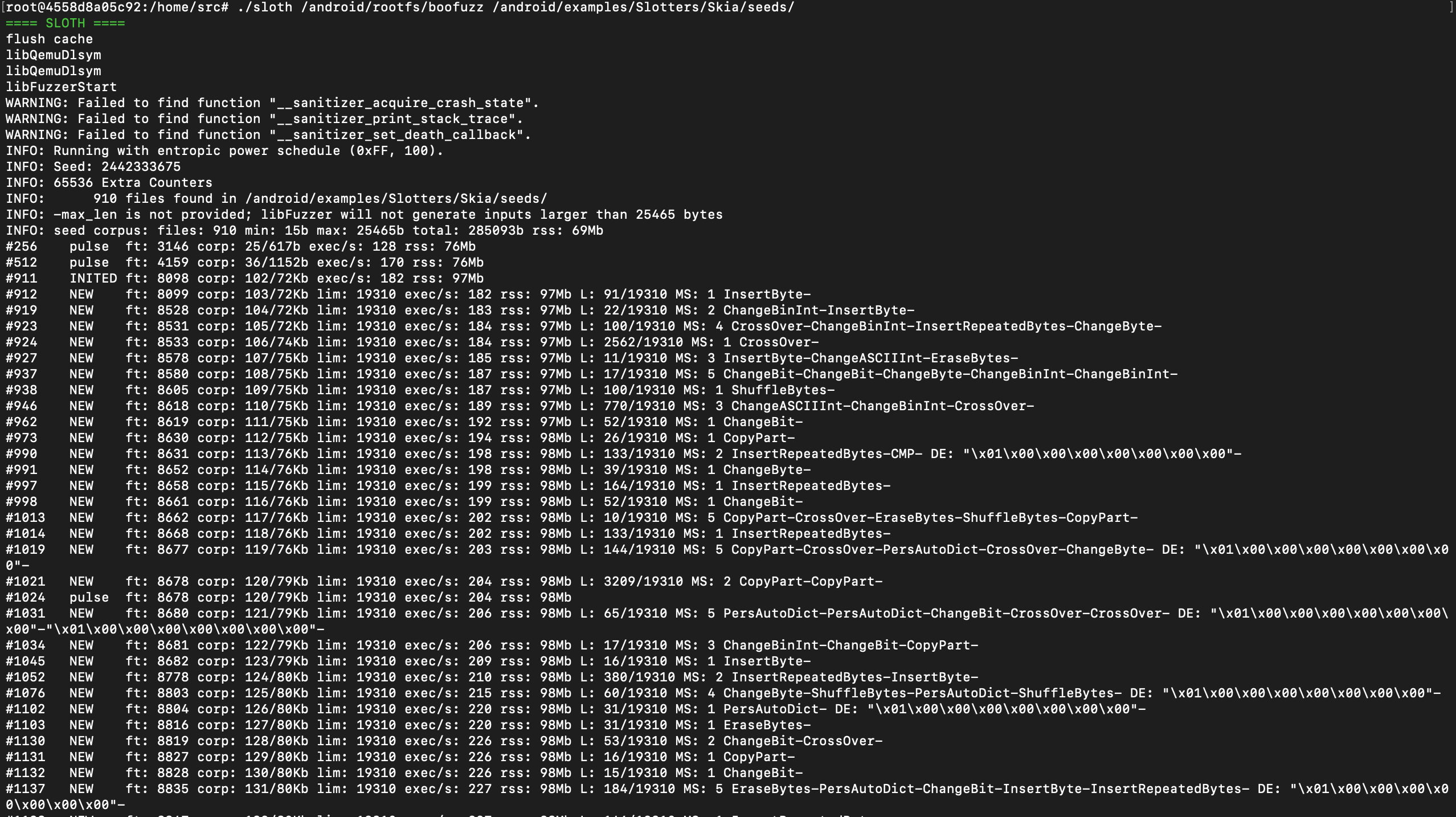
PS
There might be big boo-boo I didn't think of. Please let me know if there's any improvements that need to be done or anything I missed out to handle on TB cache. 🙏🏻
References
- https://andreafioraldi.github.io/articles/2019/07/20/aflpp-qemu-compcov.html
- https://abiondo.me/2018/09/21/improving-afl-qemu-mode/
- https://airbus-seclab.github.io/qemu_blog/
- http://people.redhat.com/pbonzini/qemu-test-doc/_build/html/topics/Translator-Internals.html
- https://googleprojectzero.blogspot.com/2020/07/mms-exploit-part-1-introduction-to-qmage.html
To-Do
- Make sure coverage is working
- Check if it works with -fork
- Improve Code Coverage/Add extra instrumentation.
- Add CMP coverage
- Add ASAN
- Fuzzing support Android JNI libraries